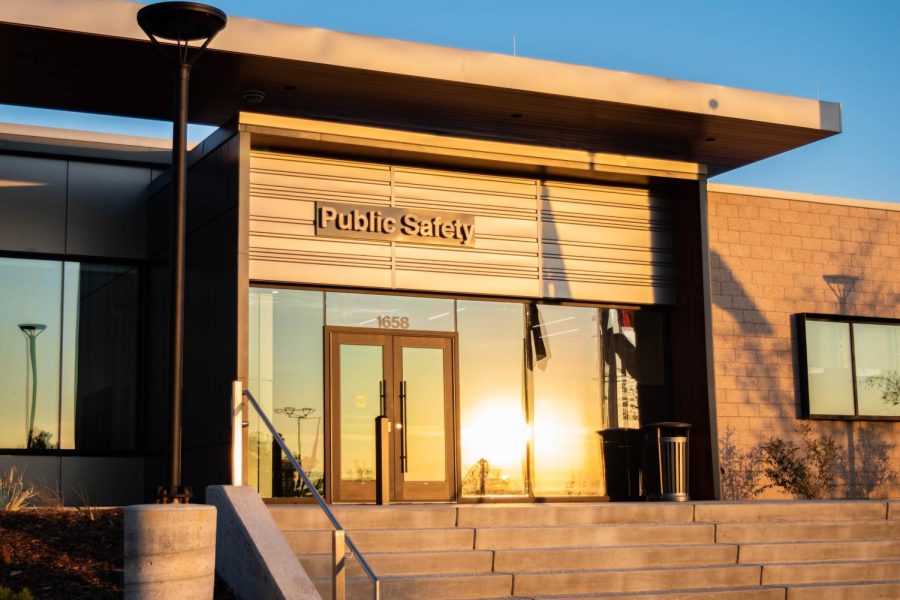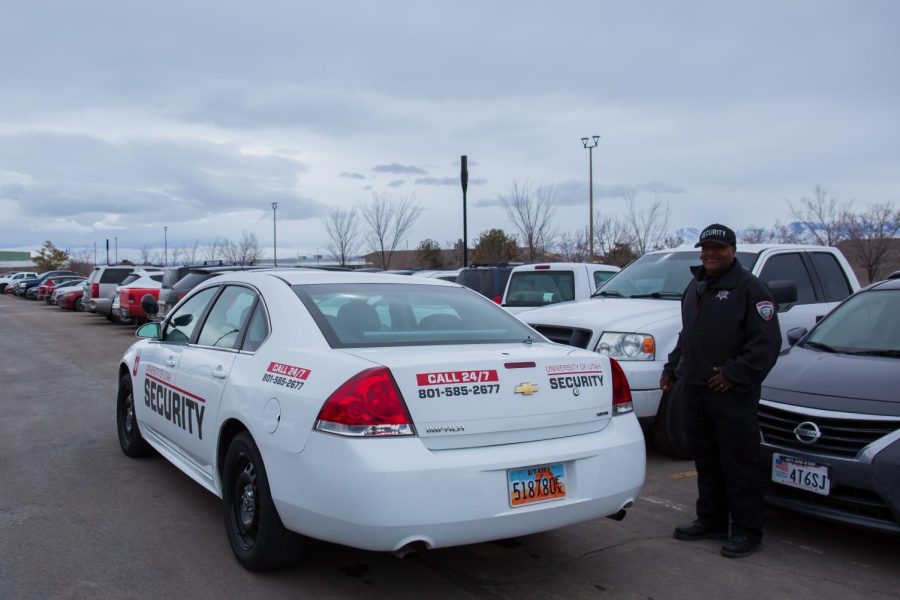How Campus Safety at the U Has Changed Since 2018
A campus security officer poses beside his car by the Public Safety Office on the University of Utah campus in Salt Lake City on Monday Feb. 27, 2023. (Photo by Julia Chuang | The Daily Utah Chronicle)
April 18, 2023
In October 2018, Lauren McCluskey was murdered on the University of Utah’s campus. She had reached out multiple times to the U Police for help, but was largely ignored.
At the time, Keith Squires, the U’s current chief safety officer, had just left a position with the state of Utah and was contacted by the president of the U to assist in an independent investigation into the university’s response to McCluskey’s situation.
This investigation revealed several “critical findings” within the department. As a result, Squires and his team gave the university a list of 30 recommendations “on things that we felt the university needed to do” to fix the University Department of Public Safety.
The U accepted all the recommendations and has been working to improve campus safety since, creating a Crime Victim Advocates team and a Professional Standards Unit for the DPS. Squires said an overarching theme in all the changes was that the culture of the police department had to change.
Culture Shift in the DPS
Changing the culture meant overhauling the department’s structure, namely by creating the position that Squires holds now: Chief Safety Officer. The CSO is part of the university president’s cabinet. Squires said the creation of this position “elevates the level of involvement in public safety right up to the highest levels of the university.”
It also allows the whole DPS to work together under the CSO, rather than having “silos” where different sections of the department work independently from each other, according to Squires.
“We had a very police-centric department before 2018,” Squires said. “We didn’t look at the department holistically, so that all of the resources could be used and to full advantage for the community.”
The DPS also changed how they recruit officers. Rather than simply looking to fill vacancies in the department, they now look for candidates who “specifically want to work at this university campus and be here as part of our team,” Squires said, which is vital in creating a culture of trust and respect within the department and the community.
“We really want to attract people who care about this community and want to be here for a long time,” he said.
This new recruiting process is necessarily picky, but Squires said that’s a sacrifice he’s willing to make.
“I’d rather go without filling positions than hire the wrong people for those positions, especially as a police officer,” he said.
Squires said the DPS has overturned 94% of its staff since McCluskey was murdered.
“And it really reflects just a new attitude, a new culture that we’re bringing to how we do and provide services here,” he said.
Preventing Police Brutality
On the Day of Collective Action on Feb. 8, the DPS held a panel discussion, Reimagining Public Safety, to talk about policing and ways to keep students safe — both on and off campus.
Jason Hinojosa, interim chief of police at the time of the event, said preventing police brutality in their department starts by eliminating an “us against them” mentality that persists in some areas of the country.
“What we need to do to make sure that what happened in Memphis doesn’t happen here, is to make sure that our culture is such that we see those warning signs,” he said, referring to Tyre Nichols, a 29-year-old Black man who was killed in January after he was pulled over by Memphis police, who violently beat him for three minutes.
Squires said he’s confident that the systems and culture they have in place at the U will prevent police brutality from happening on campus.
“The key to making sure that something like that doesn’t happen is the integrity of the people that you hire and the structures that you put in place,” he said. He added that intervention at a smaller degree is an integral part of this prevention.
That’s the reason for another one of the significant changes the U has implemented in their policing: an independent review committee that reviews every complaint, major or minor, brought against a member of the DPS, from the newest officer to Squires himself.
“It’s the little things that can turn into big things,” Squires said, adding that it’s essential to catch all mistakes that officers make, no matter how small.
This “gives us a chance to go in and coach that employee” and prevent something similar from happening in the future.
Another change is requiring officers to wear body cameras, which Squires approved after he was appointed CSO. Squires said this is helpful to show what the officers are “dealing with and how they are dealing with it,” the circumstances they face whenever they take action, what they do wrong and what they do right.
“Some of the things you would normally think of when you think of body cameras are pursuits or use of force … but we’re also finding in our regular review of the officers’ video that they’re just doing some amazing work,” he said.
Recently, the U Police have also stopped carrying nightsticks, which Squires said came at officers’ request after Nichols’ murder.
“It was from the officers and from the supervisors and saying, ‘Why are we still carrying these and still training on these in this day and age?’” Squires said. “They were outraged by what they saw. And so we looked at all of the information, and I agreed with them.”
He added that when police first started using batons, they were trained to use them as a last resort to prevent someone from being harmed. However, with modern technology such as tasers, nightsticks are now unnecessarily brutish.
“The most valuable tool that we always have is just our ability to communicate hopefully with individuals to de-escalate a situation and avoid having to use any force at all,” Squires said.
Integrating into the Community
Squires also stressed the importance of the U Police acting not just as enforcers of the law but as members of the community.
“We want this to be truly a feeling of community — that we are part of our community, that we are able to listen to our community and understand what their expectations are,” he said.
As part of the new culture, Squires said that their officers, more than anything, want to help people. Recently, two new officers were hired out of the U hospital security system.
“The best part … of what they experienced over there was the times that they were able to help people,” Squires said. “Those kinds of things are what most of us get into this work for, and that’s who we’re really wanting to be part of this team.”

The Future of Public Safety at the U
Although the DPS has made many changes since 2018, Squires said there is still work to be done.
Currently, the DPS is in the process of putting together their second climate survey for safety issues on campus, and they’re also conducting listening tours, where they meet with different groups on campus and receive feedback about campus safety, Squires said.
“Their candid feedback and information have become items that we’re working to make actionable,” Squires said.
The DPS also has agents for change in their own office: their student interns. Muskan Walia, a DPS intern, was another one of the panelists at the event and discussed how she often speaks her mind about campus safety and policing to her superiors in the department.
“They want to hear my feedback, and I have such an open door access to them all the time,” Walia said. She added that as a person of color, she is grateful to have a chance to work in the DPS, a position that she said felt “misaligned” initially.
“I realize how much we need to keep pushing that the people closest to pain should also be the closest to power and that they will inform the education,” she said.
Nahum Tadesse, the lead presidential intern at the U, was another one of the panelists. During the event, he discussed a conversation he had with a member of the U Police, in which he asked the officer to speak to him not as a cop but as a fellow member of the community.
“When that layer is removed, and the police officer is seeing themselves as a community member as well, that is authenticity,” Tadesse said.
Still, while these students recognize departmental progress and work within the system to help make progress of their own, they know the battle is not over.
“I think what success would look like to me is students feeling safe on their campus and in their community and not dying,” Tadesse said, when asked what he thought campus safety would look like in 10 years.
“In the last four years, multiple students died due to interpersonal violence,” Tadesse said. “So I think success would be waking up and not having to see your classmate’s name in the news.”











Shawn Scarlata • Feb 23, 2024 at 11:54 pm
Safety and security are of utmost importance at home and at the workplace. An integrated security system can give you peace of mind and provide the security you need. An integrated security system links together all of the components of your security system to provide better control and monitoring. The benefits of an integrated system far outweigh the cost, giving homeowners and businesses the security they need at an affordable price.